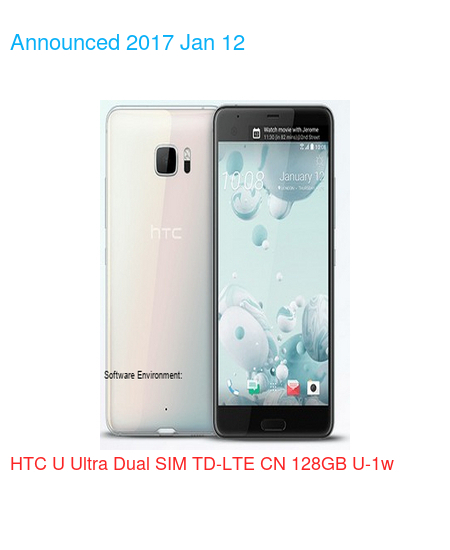| Brand | HTC |
| Model | U Ultra Dual SIM TD-LTE CN 128GB U-1w |
| Released | 2017 Mar 2 |
| Announced | 2017 Jan 12 |
| Hardware Designer | HTC |
| Manufacturer | HTC |
| Codename | HTC Ocean Note |
| General Extras | Haptic touch feedback |
| Device Category | Smartphone |
| Width | 79.79 mm |
| Height | 162.41 mm |
| Depth | 7.99 mm |
| Dimensions | 3.14×6.39×0.31 inches |
| Mass | 170 g |
| Platform | Android |
| Operating System | Google Android 7.0 (Nougat) |
| Software Extras | Voice Command , Navigation software , Intelligent personal assistant |
| CPU Clock | 2150 MHz |
| CPU | Qualcomm Snapdragon 821 MSM8996AB Pro, 2016, 64 bit, quad-core, 32 Kbyte I-Cache, 32 Kbyte D-Cache, 1536 Kbyte L2, 14 nm, Qualcomm Adreno 530 GPU |
| RAM Type | LPDDR4 SDRAM |
| RAM Capacity (converted) | 4 GiB RAM |
| Non-volatile Memory Interface | Yes |
| Non-volatile Memory Capacity (converted) | 128 GB ROM |
| Display Diagonal | 145 mm |
| Resolution | 1440×2560 |
| Horizontal Full Bezel Width | 8.7 mm |
| Display Area Utilization | 69.3% |
| Pixel Density | 515 PPI |
| Display Type | Color PVA TFT LCD display |
| Display Subtype | SLCD5 |
| Number of Display Scales | 16.8M |
| Scratch Resistant Screen | Sapphire Glass |
| Secondary Display Diagonal: | 52 mm |
| Secondary Display Resolution | 1040×160 |
| Secondary Display Pixel Density (dot pitch): | 514 PPI |
| Secondary Display Type: | Color PVA TFT LCD 2nd display |
| Secondary Number of Display Colors/Scales: | 16.8M |
| Graphical Controller | Qualcomm Adreno 530 |
| Dedicated Graphics Memory | 1 MiB |
| A/V Out | DisplayPort |
| Microphone(s) | 4 |
| Loudspeaker(s): | stereo |
| Audio Output: | No |
| Supported Cellular Bands | GSM850 , GSM900 , GSM1800 , GSM1900 , UMTS2100 (B1) , UMTS1900 (B2) , UMTS850 (B5) , UMTS900 (B8) , CDMA800 (BC0) , TD-SCDMA2000 , TD-SCDMA1900 , LTE2100 (B1) , LTE1800 (B3) , LTE850 (B5) , LTE2600 (B7) , LTE900 (B8) , TD-LTE2600 (B38) , TD-LTE1900 (B39) , TD-LTE2300 (B40) , TD-LTE2500 (B41) bands |
| Supported Cellular Data Links | GPRS , GPRS MSC33 , EDGE , UMTS , HSUPA , HSUPA 5.8 , HSDPA , HSPA+ 21.1 , cdmaOne , CDMA2000 1x , CDMA2000 1xEV-DO , CDMA2000 1xEV-DO Rev A , TD-SCDMA , TD-HSDPA , LTE , LTE 150/50 , LTE 300/50 , LTE 450/50 , LTE 600/50 data links |
| SIM Card Slot | Nano-SIM (4FF) |
| Complementary Phone Services | Voice transmission , Voice speaker , Vibrate , Speakerphone , ANC , HD Voice , VoLTE |
| Dual Cellular Network Operation | Dual standby |
| Sec. Supported Cellular Networks: | GSM850 , GSM900 , GSM1800 , GSM1900 |
| Sec. Supported Cellular Data Links: | GPRS , EDGE |
| Sec. SIM Card Slot | Nano-SIM (4FF) |
| Touchscreen Type | Capacitive multi-touch screen |
| Expansion Interfaces | TransFlash , microSD , microSDHC , microSDXC |
| USB | USB 3.0 / 3.1 Gen 1 / 3.2 Gen 1×1 |
| USB Services | USB charging , USB fast charging , USB Host , USB OTG 1.3 , USB PD |
| USB Connector | USB C reversible |
| Bluetooth | Bluetooth 4.2 |
| Wireless LAN | 802.11a , 802.11b , 802.11g , 802.11n , 802.11ac |
| Wireless Services | AirPlay , DLNA , Miracast , Wi-Fi Direct , Wi-Fi Tethering |
| NFC | NFC A , NFC B |
| FM Radio Receiver | No |
| Complementary Satellite Services | Simultaneous GPS , A-GPS , Geotagging , QuickGPS |
| Supported GLONASS protocol(s) | L1OF |
| Supported BeiDou system (BDS) | B1I BeiDou receiver |
| Camera Placement | Rear |
| Camera Image Sensor | BSI CMOS |
| Number of effective pixels | 12.6 MP camera |
| Aperture (W) | f/1.80 |
| Zoom | 1.0 x optical zoom |
| Focus | PD AF , Laser AF |
| Min. Equiv. Focal Length | 25 mm |
| Video Recording | 3840×2160 pixel |
| Flash | dual LED |
| Camera Extra Functions | OIS , HDR photo , HDR video , Red-eye reduction , Slow motion video , Burst mode , Touch focus , Macro mode , Panorama Photo , Face detection |
| Aux. Camera Image Sensor | No |
| Aux. 2 Camera Image Sensor | No |
| Aux. 3 Camera Image Sensor | No |
| Aux. 4 Camera Image Sensor | No |
| Secondary Camera Placement | Front |
| Secondary Camera Sensor | BSI CMOS |
| Secondary Camera Number of pixels | 16.3 MP sec. cam |
| Secondary Aperture (W) | f/2.00 |
| Secondary Video Recording | 1920×1080 pixel |
| Secondary Camera Extra Functions | HDR photo , Panorama Photo , Face detection , Smile detection , Face retouch |
| Sec. Aux. Cam. Image Sensor | No |
| Built-in compass | Yes |
| Built-in accelerometer | Yes |
| Built-in gyroscope | Yes |
| Additional sensors | FP sensor , Hall , L sensor , P sensor |
| Protection from solid materials | Yes |
| Protection from liquids | Yes |
| Battery | Li-ion |
| Nominal Battery Voltage | 3.85 Volts |
| Nominal Battery Capacity | 3000 mAh battery |
| Nominal Battery Energy | 11.55 Wh |
| Estimated Battery Life | 14.0 hours |
| Talk Time: | 26.0 hours |
| Market Countries | China , HK |
| Market Regions | Asia , Southeast Asia |
| Mobile Operator | China Mobile Limited China Telecom Corporation Limited China Unicom Netcom Limited |
| Added | 2024-06-24 |
Specifications data description of this 📱HTC U Ultra Dual SIM TD-LTE CN 128GB U-1w📱
Title: **Device Specification: A Comprehensive Overview** 🌐📅🏋️🌈🤖🛠️🚀🔧💪🖥️🎮🗂️📷🎥🔈📡📶💡🎁🔋🔌**
Introduction
————
In this article, we will delve into the fascinating world of device specifications, providing a detailed analysis of each component’s role in delivering a seamless user experience. We will explore the various aspects of the device, including its network capabilities, launch details, design features, display, operating system, chipset, CPU, GPU, memory, camera, sound, communication options, additional features, and battery life.
Lineup and Design 📅🏋️
——————-
As we discuss the device’s lineup, it’s essential to appreciate the design aspect that makes it stand out from the competition. Manufacturers constantly innovate and refine their designs to cater to users’ preferences and technological advancements. The device’s aesthetics, ergonomics, and build quality create an exceptional first impression, while its performance seals the deal.
Specifications 🌐🤖🛠️🚀🔧💪🖥️🎮🗂️📷🎥🔈📡📶💡🎁🔋🔌
————–
### 🌐 Network
The network capabilities of a device significantly impact the user experience. Seamless connectivity is a fundamental requirement for modern devices, including support for Wi-Fi, cellular networks, and Bluetooth technologies. These connections allow users to access the internet, communicate with other devices, and leverage cloud-based services.
### 📅 Launch
Timely releases are crucial in the ever-evolving tech industry. By staying updated with the latest launches, users can ensure they don’t miss out on cutting-edge technology and new features.
### 🏋️ Body
A device’s build quality and aesthetics are vital factors influencing user experience. Sleek and durable designs, coupled with ergonomics, ensure a comfortable and long-lasting companionship between users and their devices.
### 🌈 Display
A captivating display is an indispensable aspect of contemporary devices. User interfaces come alive on vivid and responsive screens, showcasing resolutions, color reproduction, and brightness levels that impress.
### 🤖 OS
The choice of an operating system defines a user’s interaction with their device. A robust OS enables seamless integration of features, applications, and services, ensuring a smooth and efficient user experience.
### 🛠️ Chipset
The chipset serves as the backbone of a device, ensuring various subsystems function harmoniously. By choosing a powerful chipset, manufacturers empower their devices with the ability to handle resource-intensive tasks and applications with ease.
### 🚀 CPU
A powerful processor is essential for swift and efficient performance. CPUs enable devices to multitask, run applications, and browse the web without compromising user experience.
### 🔧 CPU
The GPU complements a CPU’s processing capabilities, especially when it comes to graphical processing tasks such as gaming, video editing, and virtual reality.
### 💪 Memory
Memory plays a crucial role in managing applications and data. Ample memory ensures smooth multitasking, minimizes load times, and allows for efficient data management.
### 🖥️ Storage
Storage capacity and write speeds are crucial factors for users storing applications, media, and documents on their devices. Fast and spacious storage solutions promote seamless user experiences.
### 🎮 Camera
Camera specifications have become increasingly important as users prioritize quality imaging capabilities. High-resolution cameras, coupled with advanced features and software, allow users to capture and share high-quality images and videos.
### 🗂️ Sound
Audio quality is an essential consideration for many users. Clear and well-defined sound profiles, along with noise-cancellation technologies, enable devices to offer immersive audio experiences.
### 📷 Communication
Seamless communication with others is essential for devices. Effective communication options include support for popular services, messaging platforms, and protocols.
### 📡 Connectivity
Connectivity options such as Wi-Fi, cellular networks, GPS, and NFC ensure users can easily and rapidly share data, connect with other devices, and leverage a wide range of location-based services.
### 💡 Features
Device manufacturers often incorporate innovative features designed to differentiate their products from competitors. Unique and thoughtful inclusions create engaging and enjoyable experiences for users.
### 🔋 Battery
Battery life is a critical aspect of a device’s user experience. A long-lasting battery enables users to perform tasks throughout the day without requiring frequent recharges.
### 🔌 Charging
Rapid and efficient charging technologies, such as wireless charging and power-efficient charging algorithms, minimize downtime and promote convenient device usage experiences.
Conclusion 💡🎁
———-
In conclusion, the device specifications highlighted above contribute immensely to users’ experiences. By understanding the importance of each aspect, users can make informed decisions when selecting their next device. We encourage readers to leave comments discussing the device features they prioritize when making a purchasing decision.














